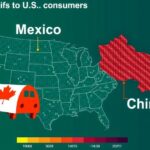Trump Signs Tariffs on Imports from Canada, Mexico, and China, Raising Inflation Risks
President Trump has enacted substantial tariffs on imports from Mexico, Canada, and China, which may elevate inflation risks and disrupt businesses in North America. The measures include duties of 10% on Chinese goods and 25% on Mexican and Canadian imports while also provoking possible retaliatory tariffs. The decision aligns with Trump’s efforts to combat fentanyl trade and illegal immigration, despite potential economic repercussions.
On Saturday, President Donald Trump fulfilled a campaign promise by signing an order to implement significant tariffs on imports from Mexico, Canada, and China, potentially leading to higher inflation and business disruptions across North America. The tariffs, established at 10 percent for all imports from China and 25 percent for imports from Mexico and Canada (with a 10 percent rate on Canadian energy), take effect on Tuesday. This decision highlights his administration’s attempt to mitigate the manufacturing and spread of fentanyl while tackling illegal immigration.
The order lacks provisions for exceptions, which could adversely affect industries dependent on imports, particularly homebuilders relying on Canadian lumber. The tariffs also roll out additional duties on imports valued below $800 that previously entered the country duty-free. As retaliation from the affected countries seems likely, the administration has indicated a mechanism to escalate tariff rates if necessary.
Trump’s economic strategy is portrayed as a political gamble, aiming to avoid worsening inflation or provoking backlash from voters. Previous polling indicates a division among American voters regarding tariffs, but the president’s approach emphasizes a long-term vision on trade policy. Concerns mount as rising tariff rates could lead to higher consumer prices and disrupt business investments integral to economic growth.
Economists suggest sustained tariffs may hinder growth in the U.S., Canada, and Mexico while impairing consumer sentiment, with inflation expectations increasing. Despite heightened costs linked to tariffs, Trump maintains that revenues from these duties could substitute for income tax, arguing this could align with historical precedents. However, experts warn that the implications of these policies could present significant obstacles for consumer expenditure.
As Canada and Mexico prepare possible retaliatory measures, uncertainty looms over future negotiations. Canadian Prime Minister Justin Trudeau has communicated that Ottawa is ready to respond should circumstances necessitate, while Mexican President Claudia Sheinbaum stresses the importance of dialogue in addressing these challenges. Trump has set forth a broader tariff agenda, which entails potential duties on a variety of goods, indicating tariffs will persist throughout his presidency.
The forthcoming weeks are critical as Trump will face challenges in securing budgetary agreements and advancing tax cuts through Congress, alongside potential pushback from Democratic lawmakers seeking to limit tariff implementation without legislative approval.
The decision to impose tariffs correlates with President Trump’s objectives of mitigating fentanyl trade and addressing illegal immigration. With America engaged in significant trading relationships with Canada and Mexico, the introduction of tariffs may provoke reciprocal actions that could disrupt these ties. Economic forecasts suggest a potential strain on inflation rates as domestic prices for consumer goods may rise, resulting in hesitance among consumers and investors alike. The backdrop of this tariff announcement includes a mixed reception from voters regarding trade policies. While Trump emphasizes the need for protective measures against foreign competition, dissenting opinions exist about the ramifications such tariffs may yield on the economy. Furthermore, the dynamic political environment necessitates negotiations among Congress to reconcile tariff powers with the president’s objectives.
In summary, President Trump’s recent tariff orders mark a significant shift in U.S. trade policy that may have profound implications for inflation, business growth, and international relations. With the potential for retaliatory actions from Mexico and Canada, coupled with escalating tariffs on various imports, the administration faces both economic and political challenges ahead. As negotiations unfold, the impact of these tariffs will warrant close scrutiny from policymakers, economists, and consumers alike.
Original Source: www.pbs.org








Post Comment